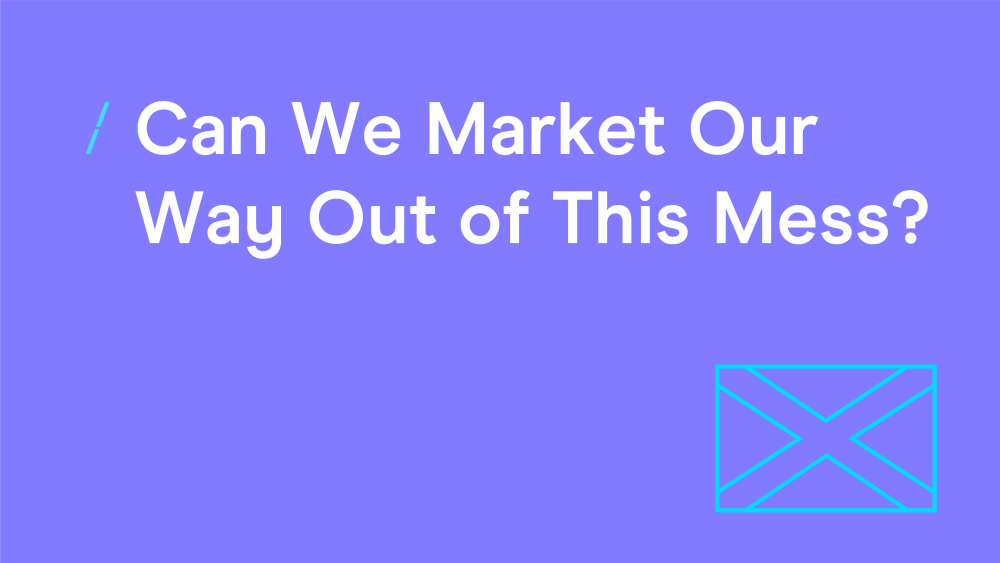Can We Market Our Way Out of This Mess?
26 Nov 2020

As part of DMA Scotland's regional content, guest contributor Lou Kiddier, AlwaysBeContent explores why every business needs to consider the personal, social, and ecological priorities of the world, and why we should be viewing our customers as complex beings rather than just consumers.
The world needs a new kind of marketing. A kinder kind of marketing. To ‘build back better’, doesn’t mean ‘build back exactly the same’. Every business needs to take into account the personal, social and ecological priorities of the world – partly because the evidence shows that ‘good businesses’ do better. And it doesn’t have to be hard.
A cartoon titled “it’s that easy” began circulating on the internet last summer. Created by artist Tommy Siegel, the cartoon became a hit within the ‘climate’ circles of social media.
The simple comic-style image shows a father kneeling next to his son, explaining the prevailing approaches to climate change in each of the last four decades.
In the ‘80s version, the dad says, “Pick up your litter and save the earth.” In the ‘90s, he tells his son to recycle. In the 2000s, he suggests reducing their carbon footprint.
The 2010s?
The dad explains to his son, “Completely restructure global economic systems and you may be able to save a remnant of humanity.”
That sudden escalation to a dire tone is good comedy. Then there’s the absurdity of putting the responsibility of saving the planet on the shoulders of a wide-eyed little boy.
But that’s precisely what makes the cartoon so incisively relevant today: escalation and wrongly assigned responsibilities.
It’s easy to see how these themes play out in our economy and in the ideas underpinning that economy.
The problem with the economy itself is that we’re consuming too much stuff and destroying ecosystems in the process. That has escalated into a global pandemic in 2020.
The problem with the underlying ideas is that we keep putting the onus on individuals to solve these problems. Even though, we should be working together to cure our maladies.
In short, the cartoon gets it. If we want to get out of this mess, we’ll need to restructure our global economic system.
And we’re not alone in thinking this. The World Economic Forum agrees. So does David Attenborough. As well as 14,000 scientists. There are many others.
Unfortunately, it’s one of those things that’s much easier said than done. Which is also what makes Siegel’s joke work. It’s that easy, he says, when we know it’s anything but.
It’s not easy to create a truly inclusive society overnight. It’s not easy to curb the excessive consumption of the wealthiest among us. And it’s not easy to change the stories we tell ourselves as a society.
Most importantly, it’s not easy to act. Change is paralysing, because it’s simultaneously necessary and scary.
That is why, as soon as you broach the vision of a different future, you can hear entire industries groan. That includes marketing too.
After all, most agencies are in the business of helping others sell things. If we’re suggesting curbing consumerism or banning certain products, then by extension that must mean the end of marketing. Right?
Not quite.
The fact is that we’re often limited by our imagination. So much so, that it’s easier for us to imagine the end of the world than the end of our current economic system.
But if we stretch our imagination a bit further, then it becomes possible to conjure up a new world of markets and marketing.
It takes place in a near future where the focus of economies is universal human well-being, not shareholder well-being.
Marketing has a place there. Admittedly, it’s a different type of marketing. It’s one that takes into account the personal, social and ecological realities of the world.
It looks at people as complex beings and not just consumers. It looks at society as a collective force for good and not just a cluster of individuals. Above all, it recognises that it’s impossible to do marketing on a planet that isn’t fit for human life.
That new type of marketing won’t just try to push the latest smartphone on you.
It will ask you to consider whether you really need a new gadget. It will inform you about the environmental impacts of that phone. It will help you promote better right-to-repair regulations.
It’s a type of marketing that puts business back into society. Because, right now, business is somewhere else. Perhaps, in a parallel universe.
For marketers, there are practical ways to get started on this journey.
First, you can work with other businesses that try to do good. For example, we started a Dare to Care blog series in an attempt to map out some of these businesses in the world.
You can also put your business through accreditation schemes. This will force you to assess how sustainable you really are, and it will help you identify areas where you can make real changes. (We’re currently undergoing the rigorous B-Corp impact assessment scheme.)
Or, you can inform yourself, often through career development opportunities. In our case, many of our employees have taken business sustainability and climate science courses.
It’s certainly not easy. But it’s necessary.
In September, Tommy Siegel re-posted his comic cartoon on Instagram. This time, the post’s caption read: “starting to feel a little uneasy about the ‘20s...”
We get it, Tommy. We’re uneasy too.
We don’t want 2021 to be yet another 2020. So, let’s change our markets and our marketing. But this time, let’s do it together. Eventually, it’ll get a little easier.
- Lou Kiddier, AlwaysBeContent
@AlwaysBeContent
Please login to comment.
Comments